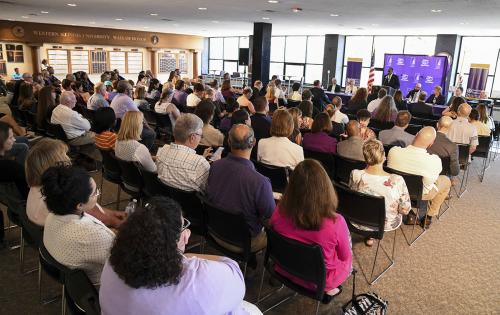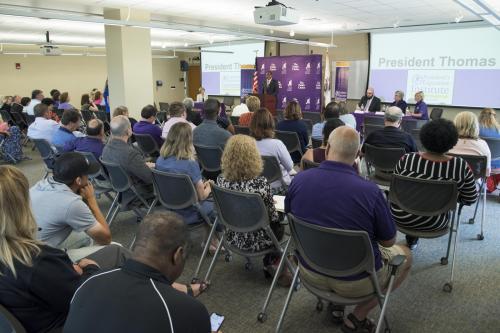University News
Positioning Western Illinois University for the Future
July 16, 2018
MACOMB/MOLINE, IL – Western Illinois University is making investments in its academic programs and service operations that will keep Western on the leading edge and position the institution for growth.
"Two years ago, we established the President's Executive Institute to signify that we will be an innovative and forward-thinking institution that is on the cutting edge of operations and services as we interact with external communities for the good of the University and communities that we serve. Today, we take Western's innovation to a higher level," said WIU President Jack Thomas. "We are investing in our academic programs and service operations that will further place Western Illinois University on the leading edge and position our institution for growth, as we prepare students, faculty, and staff to lead in diverse and dynamic communities. With our new Strategic Plan, the President's Executive Institute and our investments, we enter the future. "
The archived live stream of the press events can be found at the University's YouTube channel.
"Western Illinois University is further positioning itself for the future. We are a preeminent institution in terms of quality, and we will have a new academic structure, state-of-the-art equipment to support our leading edge instruction, new admissions teams and an increased emphasis on student persistence and completion," Thomas added. "Today, we take the next step in academic excellence as a leading institution."
According to Thomas, Neumann will oversee academic realignment that is based on the institution's areas of strength. The focus includes science and technology, business, education, community service and regional and state need.
"As Dr. Thomas has shared, Academic Affairs will restructure and reorganize as we continuously evolve and improve to meet our goals of attracting and retaining students. To determine where we are going, we must evaluate the outcomes of where we have been," Neumann said. "We have seen strong and successful outcomes in the academic areas of business, education, community service, science, technology, and in areas that meet the need of our region. These have been built on a solid foundation of general education to enhance and reinforce the importance of critical thinking, solid communication skills, the pursuit of knowledge, diversity and wellness. Long term, these Centers of Excellence will define and form our investment structure in academics within our four academic colleges."
The reorganization of colleges and departments includes:
Within the College of Arts and Sciences, select departments will form two new schools: the School of Humanities and Social Sciences, and the School of Natural Science and Mathematics, in addition to biology, the School of Nursing and psychology.
Within the College of Business and Technology, economics will join accounting and finance to form the School of Accounting, Economics and Finance, and engineering technology will merge with the School of Engineering to form the School of Engineering and Engineering Technology.
Within the College of Education and Human Services, emergency management will join the School of Law Enforcement and Justice Administration to capitalize on the natural commonalities in these disciplines. Social work will return to a department dedicated to that discipline with additional discussions underway about how best to support the remaining disciplines in health sciences. The various programs dedicated to education will merge to form the School of Education.
Within the College of Fine Arts and Communication, graphic design and graphic communication will be brought together to increase and improve the student experience in the area of graphics.
The creation of centers of excellence include:
Business with focus on accounting, finance, human resource management, management, marketing (including fashion merchandising) and supply chain management.
Education and Community Services with focus on education, law enforcement and justice administration, fire science, kinesiology (including dietetics/nutrition), social work and recreation, park and tourism administration (including hospitality).
Regional with focus on agriculture, broadcasting and journalism, communication, counseling, economics, English, museum studies, math, music, nursing, theatre, public health, psychology and speech pathology and audiology.
Science and Technology with focus on biology, chemistry, computer science, construction management, cyber security, engineering, engineering technology, GIS, information systems and physics.
Creation of new online degree programs:
Undergraduate: Accountancy, economics, finance, geography and GIS, human resource management, law enforcement and justice administration, management, marketing, sociology and supply chain management.
Graduate: Educational studies, geography, liberal arts and sciences, and sport management, as well as minors in business, finance, history, nonprofit administration, philosophy and pre-MBA.
Post graduate certificates: Community development and planning and GIS analysis
Facilities enhancements:
As a result of donations, a law enforcement and justice administration crime lab will be established in Tillman Hall, and the Centennial Honors College will move to Simpkins Hall.
Recruitment:
Internal recruitment to encourage eligible WIU students to explore integrated degree program opportunities to earn bachelor and master degrees in five years.
Dual Enrollment:
Greater emphasis on high school dual enrollment programs, with 10 new agreements established.
WIU-Quad Cities:
New classes/programs will be established at WIU-QC including psychology and social work undergraduate degrees; a hybrid speech pathology and audiology program; and select ROTC courses.
According to Neumann, these strategic changes and realignments are designed to foster collaboration and natural synergies that will allow different disciplines to advance together.
"In addition to these realignments and reorganization, we will continue efforts to further streamline our general education in such a way that stays true to the institution's foundational goals, while at the same time making the most efficient use of those academic hours dedicated to general education for our students," she explained.
WIU Board of Trustees Chair Carolyn Ehlert Fuller added that the board has charged President Thomas with defining the strengths of Western Illinois University to advance the institution's quality, opportunity and affordability.
"We were extremely pleased with the creation and adoption of the new Higher Values in Higher Education Strategic Plan. This plan, coupled with today's announcements, show that Western Illinois University is positioning itself for the future," Ehlert Fuller said. "The Board thanks President Thomas and his leadership team for advancing our great University. We look forward to realizing the plans set forth today."
Rep. Norine Hammond noted that while higher education across the country is facing challenges with declining enrollments and higher tuition costs, Western recognizes these challenges and is moving forward.
"Western is taking necessary steps to focus on programs that have the greatest rate of return for the students, as well as employers," Hammond added.
Rep. Tony McCombie added that she is excited about Western's changes.
"Western is moving in a direction that positions itself for a strong future," McCombie said.
"Western is entering a future that defines its unique mission and niche within Illinois public higher education. Thank you for ensuring optimal use of limited state resources by focusing on your centers of excellence. This is what defines you as a University community and an integral component to Illinois public higher education. Western is truly an outstanding institution and I know that you will be successful in your endeavors," said Illinois Board of Higher Education Executive Director Al Bowman.
"We have a very exciting future, framed by our strategic plan, our work with colleagues outside the University through the President's Executive Institute and with the announcements made by President Thomas and Provost Neumann in positioning Western Illinois University for the future," added Joe Rives, vice president of Quad Cities and planning. "All of these actions position Western to be a national leader in quality, opportunity and affordability."
Posted By: University Communications (U-Communications@wiu.edu)
Office of University Communications & Marketing



Connect with us: